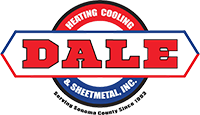Air pollution is not just an outdoor problem in Santa Rosa. Outside pollutants can affect the quality of your indoor air as well, especially in the summer. Longer days and extended hours of sun equals more ultraviolet rays What’s more, the summer air tends to hang heavier than in other seasons. So, how do you fight against the heat and maintain good indoor air quality at the same time? Here are four ways that you can contribute to cleaner air inside your home or business throughout the summer season.
Keep it clean
Before incoming air is conditioned and dispersed throughout a home by the heating and cooling system, an air filter cleans the air. This makes it essential to an efficiently working process. Changing the air filters in your HVAC system is recommended year-round, but it becomes especially helpful in keeping allergens controlled in the more humid temperatures of summer. Of the two jobs that it performs, the one involving the removal of dust, pollen, pet dander, and other pollutants from the air makes a filter important to improving air quality. If it seems that you spend a lot of time dusting, it could be a sure sign that your filters need changing. While replacing filters is one way to keep indoor air clean, another is by cleaning air vents. The coolants used to refrigerate the air evaporate and add moisture to it, which can promote mold growth and other allergens on your vents. Having them professionally cleaned once a year is usually preferable to you doing it yourself.
Let air in?
Some professionals in the heating and cooling business disagree about this point. It might seem counteractive to let outside air into the home. On the other hand, when done in moderation, it can help to let a cool breeze through occasionally so that the fresh air circulates throughout the venting system. When the air is constantly closed off, the air can become stale and stagnant. When the days are cooler and the air is windy, pollutants get dispersed. Whatever gets through the window will typically be caught by the vents as the new air rotates in.
Control humidity
Humidity that is higher than 50% can encourage the growth of mold and can pose health problems, especially for those who suffer with respiratory conditions or allergies. Having a dehumidifier installed and running it for a few hours daily during high humidity periods can help. If you don’t choose to take that route, running the air conditioner and not letting in any outside air on particularly humid days can also help control humidity. Crawlspaces, attics, basements, and closets are the most humid areas in a home. Be sure to check these areas for humidity on a regular basis. Fix any existing cracks or gaps in your insulation.
Final thoughts
Part of improving air quality in your home includes keeping it clean. Oddly enough, some cleansers can create issues in air quality, so avoid overusing them. In addition to this, keep air filters changed, occasionally allow fresh air in, and control your home’s humidity levels. It should go without saying that another important factor in good indoor air quality is keeping your air conditioning unit properly serviced. Call Dale Heating Cooling and Sheetmetal to find out how they can help you improve your home’s air quality for the entire summer season.

